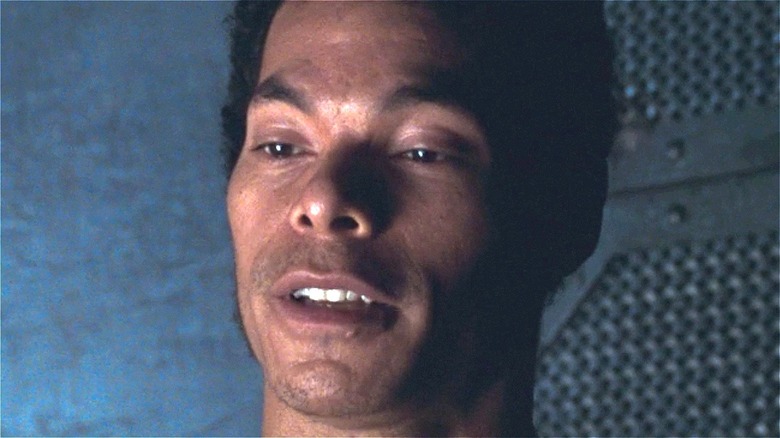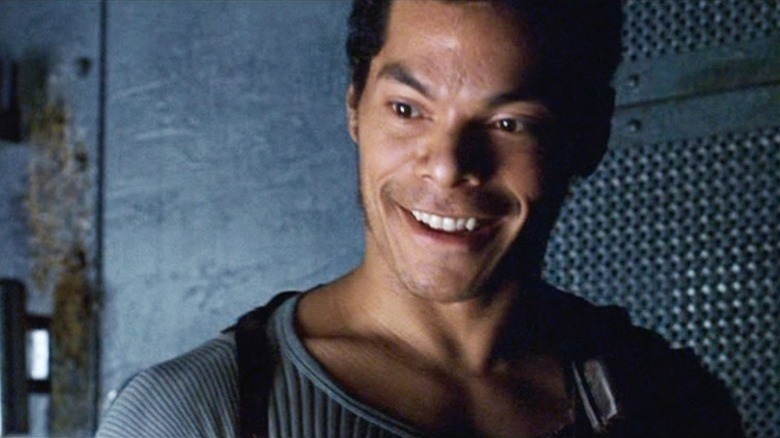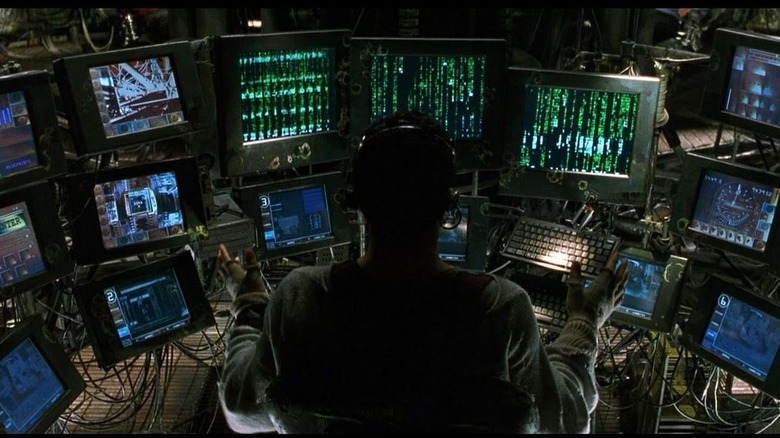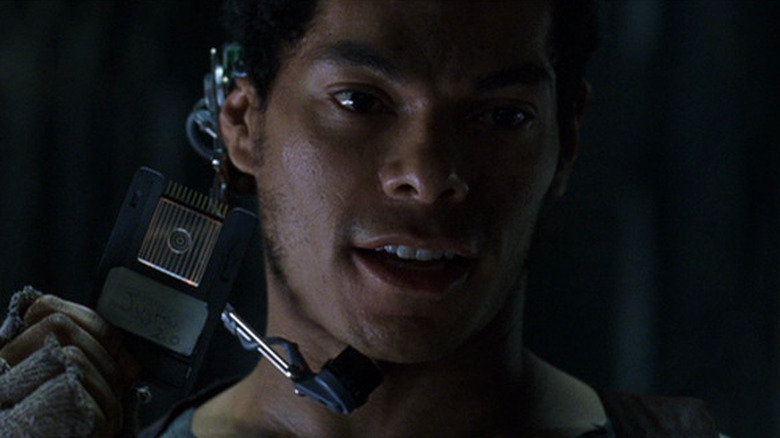How Much Money Marcus Chong Really Wanted For The Matrix: Reloaded
The first "Matrix" movie was easily one of the most successful and influential films of its day. Its unique blend of sci-fi drama and martial arts catapulted the Wachowski-directed flick directly into public consciousness, but this achievement cannot be completely chalked up to the work of its sibling writer-directors. The cast of "The Matrix" — which includes the likes of Keanu Reeves, Laurence Fishburne, Joe Pantoliano, Carrie-Anne Moss, and Hugo Weaving — was also instrumental to the film's success. However, there is one actor from the first movie who, despite playing a major part in the plot of "The Matrix," did not return for its sequels.
Marcus Chong — the actor who played the Nebuchadnezzar's Operator, Tank — seemingly dropped off the face of Hollywood following the film. This may be related to a variety of financial and legal disputes between him and Warner Bros. regarding his potential payment for "The Matrix" sequels. In short, Chong asked for more money to appear in the sequels and the filmmakers weren't willing to give it to him once they learned how much he really wanted. Although, that's only a piece of the full story.
Chong wanted to be paid significantly more for the Matrix sequels
According to his self-made documentary on YouTube, Chong (born Marcus Wyatt) had problems working on "The Matrix" from its very first day. From having to find his way alone on foot to the Warner Bros. studio in Australia (a country he had never visited) to having difficulties getting past security to waiting three months to get his first paycheck, Chong felt dissatisfied with how Warner Bros. had treated him. When Joe Pantoliano told Chong that he had been paid $1 million to play the villainous role of Cypher, Chong complained to the Wachowskis. He had only been paid $28,000.
Though Pantoliano was an older and more popular actor with more screen time and speaking roles, Chong still felt he should have been paid more. When it was time for "The Matrix Reloaded" and "Revolutions" to be made, the Wachowskis offered either $250,000 (according to Chong himself) or $400,000 (according to entertainment.ie). However, he declined, and instead allegedly asked for $1 million, according to a court document that can be seen in the documentary. The Wachowskis denied this offer.
Chong returned with a confusing counteroffer, according to E! Online, which is that he would either do the sequels for $500,000 or for free, as he wanted to "protect the role and the integrity" of the Wachowskis' films. However, as we all know now, the Wachowskis took neither pill and simply killed his character offscreen to make way for the new operator, Link (Harold Perrineau).
Chong unsuccessfully tried to get help negotiating
A large part of Chong's documentary is dedicated to his struggle in negotiating for his pay and coming to terms with Warner Bros. Chong says that the company insisted that the Screen Actors Guild represent him for all "Matrix" affairs. However, Chong's documentary shows that the SAG attorney he reached out to wasn't willing to help him negotiate this issue. Chong says he was denied the ability to have his own lawyer represent him in this instance.
Chong's struggle to get what he deemed to be fair pay for his time in "The Matrix" continued for years. According to statements made in the documentary, he never received royalties for his performance in the film, while others, namely New Zealand actor Anthony Ray Parker who played Dozer, continued receiving money from the project years later. Eventually, after repeatedly trying and failing to negotiate with Warner Bros., Chong began taking legal steps against the company.
Chong then filed a lawsuit against the makers of The Matrix
In response to being replaced by Perrineau, Chong took his grievances with Warner Bros. a step further. In 2003, he filed a lawsuit against Warner Bros. and AOL Time Warner (via The Guardian). According to him, both companies violated a verbal and contractual agreement ensuring that he would be in the sequels to "The Matrix." He also alleged that he was essentially blacklisted in the film industry thanks to a smear campaign by the people behind the movie.
However, the lawsuit fell through after Warner Bros. said that Chong had been harassing its employees over the phone. Chong's documentary shows one of these phone calls, in which Chong threatens Warner Bros. employee Steven Slack by telling him that he will "shoot you in your f—ing head." Chong alleges that Slack had called to threaten him into working on "The Matrix" sequels, but Chong's documentary never shows Slack explicitly doing so. Similarly, Chong's documentary also includes a heated phone call between himself and Lilly Wachowski's then-wife, Alisa. According to People, Chong was even arrested for making threats on October 18, 2000.



